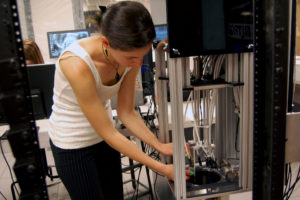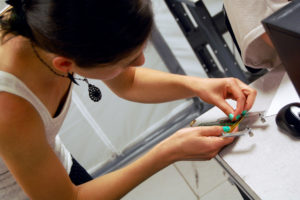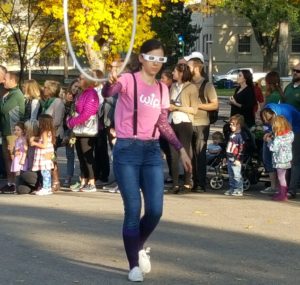
For Aurora Popescu, physics is a full-time job.
In addition to being a fourth-year undergrad in Colorado State University’s Department of Physics, Popescu works as a lab assistant and is the president of CSU’s Women in Physics club. But she wasn’t always a physics guru.
Popescu started at CSU taking French classes, but she found them too easy. Seeking a challenge, she declared physics as a major.
“Physics was extremely difficult,” she said. “I had to push myself in all sorts of science and math classes back then.”
Popescu stuck with it and still enjoys the difficulty. Although she doesn’t have a dream job in mind for after she graduates in 2019, she knows that she always wants to be doing new and challenging things in physics.
“Something that teaches me and where I have to struggle, and anything that’s not monotonous – that would make me happy,” she said.

Photon detector, physics presenter
After learning of an open research assistant job from her advisor, Popescu got involved in the High-Energy Physics lab, a research group run by Norm Buchanan, associate professor in the Department of Physics.
The lab is part of the prototype version of the International Deep Underground Neutrino Experiment (DUNE), which involves scientists and engineers from multiple countries and universities – including Colorado State University. The project is focused on studying neutrinos, one of the most abundant fundamental particles in the universe.
As a full-time lab assistant, Popescu helps in nearly every aspect of lab. On any given day, she builds photon detectors, which are used to detect neutrinos, and also writes code, makes graphs, analyzes data, or creates documentation for the lab.
“I think it’s really fun, and I’m pretty much never doing the same thing more than once,” she said.
Popescu recently gave a talk about the photon detectors at the annual meeting of the American Physical Society Four Corner Section, held this October at CSU. It was her first time presenting at a conference.
“I was extremely nervous for it, but when it was done I felt like a lot of people learned just what photon detectors were all about,” she said.

Women in physics
As the president of Women in Physics, Popescu works to encourage women to get involved in physics. The group is an undergraduate student group at CSU and a complement to CSU’s Society of Physics Students club.
Founded by Popescu and two other students, the club started as a collaborative group for women, who are underrepresented in the field of physics in general. The group also welcomes people of any gender who are interested in supporting women in the sciences.
CSU’s Women in Physics recently received an American Physical Society grant, which Popescu will use to host female speakers and bolster the group’s mentoring and outreach work, possibly with a career and resume workshop. The group has previously held discussions with Nobel laureates in physics, such as Albert Fert.
They have also traveled to Arizona, Florida and Nebraska to attend conferences for Undergraduate Women in Physics, a national program supported by the American Physical Society. In addition, the group participated last year in CSU’s homecoming parade, where Popescu, an accomplished hula-hooper, handed out rainbow diffraction glasses while hula-hooping for the entire parade route.
For more information about the club and to get involved, send an email to the group or check them out on Facebook. Popescu loves seeing new people at meetings and invites anyone to join – even if they’re not a physics major.
“We are a really fantastic group of women and men and we have tons of really fun, eye-opening experiences for you to take part in,” she said.